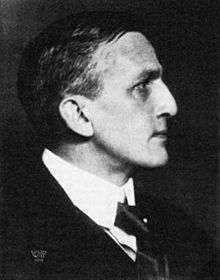Georg Friedrich Nicolai

Georg Friedrich Nicolai (born: Lewinstein) (6 February 1874 – 8 October 1964) was a German physiologist.
Biography
He was born in 1874 in Berlin. He studied at the University of Berlin, and later practiced medicine at the Charité in Berlin. He admired the works of physiologist Ivan Petrovich Pavlov, and with internist Friedrich Kraus, he published a book on electrocardiography titled Das Elektrokardiogramm des gesunden und kranken Menschen.
In 1914, at the onset of World War I, Nicolai composed an anti-war treatise called "Manifesto to the Europeans". Only three other intellectuals in Germany signed Nicolai's manifesto; they being physicist Albert Einstein, astronomer Wilhelm Julius Förster and philosopher Otto Buek.
During the war he published "The Biology of War", an indictment of warfare which was translated into several languages. [1] As a result, he was demoted and sent to the comparatively remote Tucheler Heide, West Prussia (Tuchola Forest) area. "The Biology of War" was praised by Romain Rolland, who became a friend of Nicolai.[1]
In 1922 he emigrated to South America where he worked and taught in Argentina, and later Chile.
In the 1930s he wrote Das Natzenbuch (A Natural History of National Socialist Movement and of Nationalism in General), in which he denounced nationalism as "one of the greatest, possibly greatest danger to the further development of the human race".
He died on 8 October 1964 in Santiago de Chile.
Literature
- Herbert Gantschacher (editor) "Theatre Form as an Articulated Way of Life" including essays of Hubert Steiner(Vienna), Katharina Rostock(Berlin), Jean-Jacques Van Vlasselaer(Ottawa), Marjan Bevk(Bovec), Erich Heyduck(Vienna) and Brenda Harker(Oakland) in "The Unifying Aspects of Cultures" - TRANS-Studien Bd. 1 LIT, Vienna-Berlin 2004; ISBN 3-8258-7616-0
- Herbert Gantschacher "Witness and Victim of The Apocalypse" - ARBOS, Vienna-Salzburg-Arnoldstein 2007
References
- 1 2 Wolf Zuelzer, "Nicolai, Georg Friedrich" in The World Encyclopedia of Peace. Edited by Linus Pauling, Ervin Laszlo, and Jong Youl Yoo. Oxford : Pergamon, 1986. ISBN 0-08-032685-4 (Vol. 2, p. 42-46).
Sources
| Wikisource has original text related to this article: |
- The Biology of War (1918) Full text at Internet Archive
- http://www.inst.at/trans/15Nr/10_5/10_5inhalt15.htm
- Herbert Gantschacher: The Limits of Virtual Reality or Our deal with the past and future
- Princeton University Press Manifesto to the Europeans